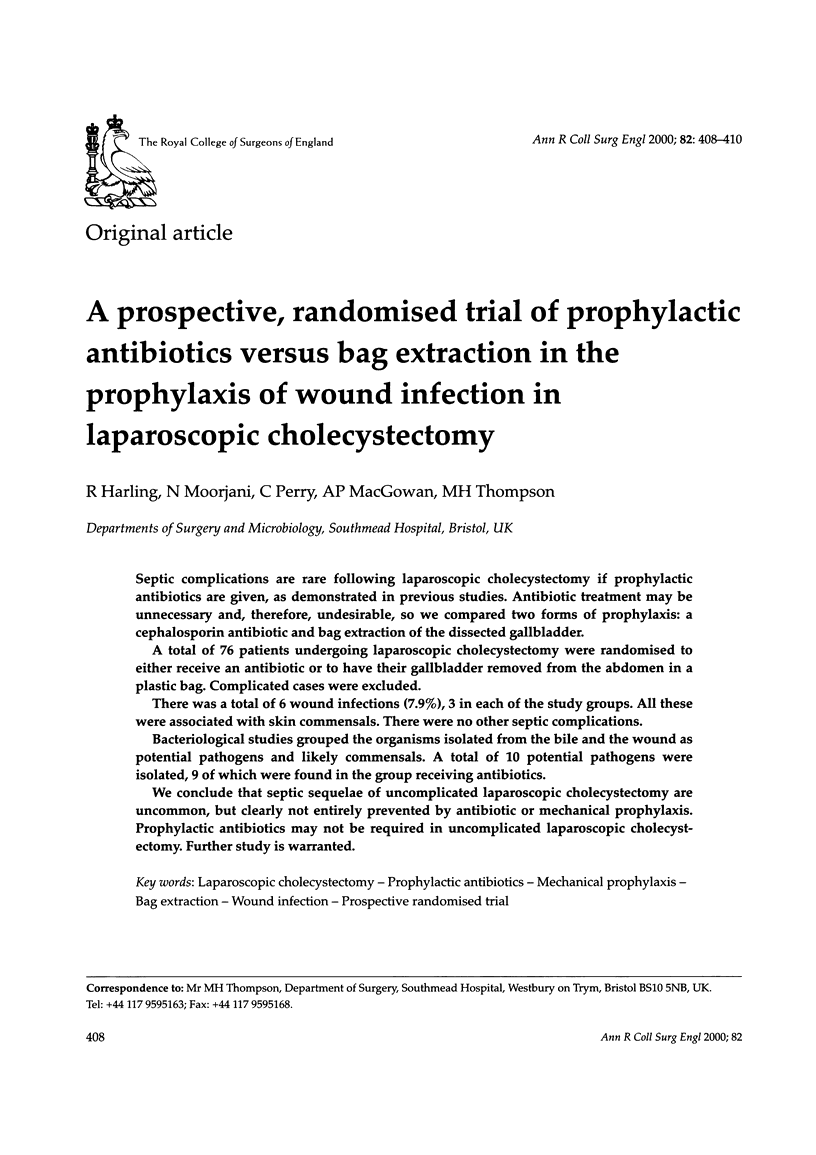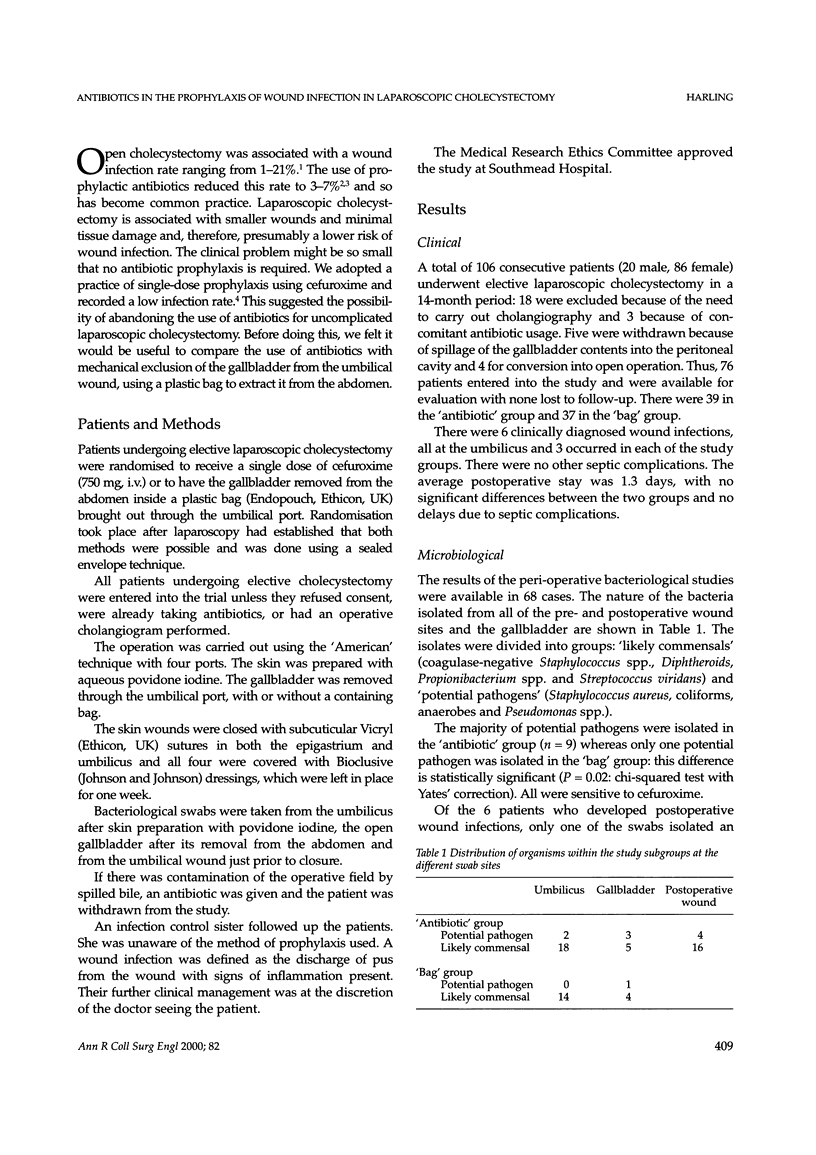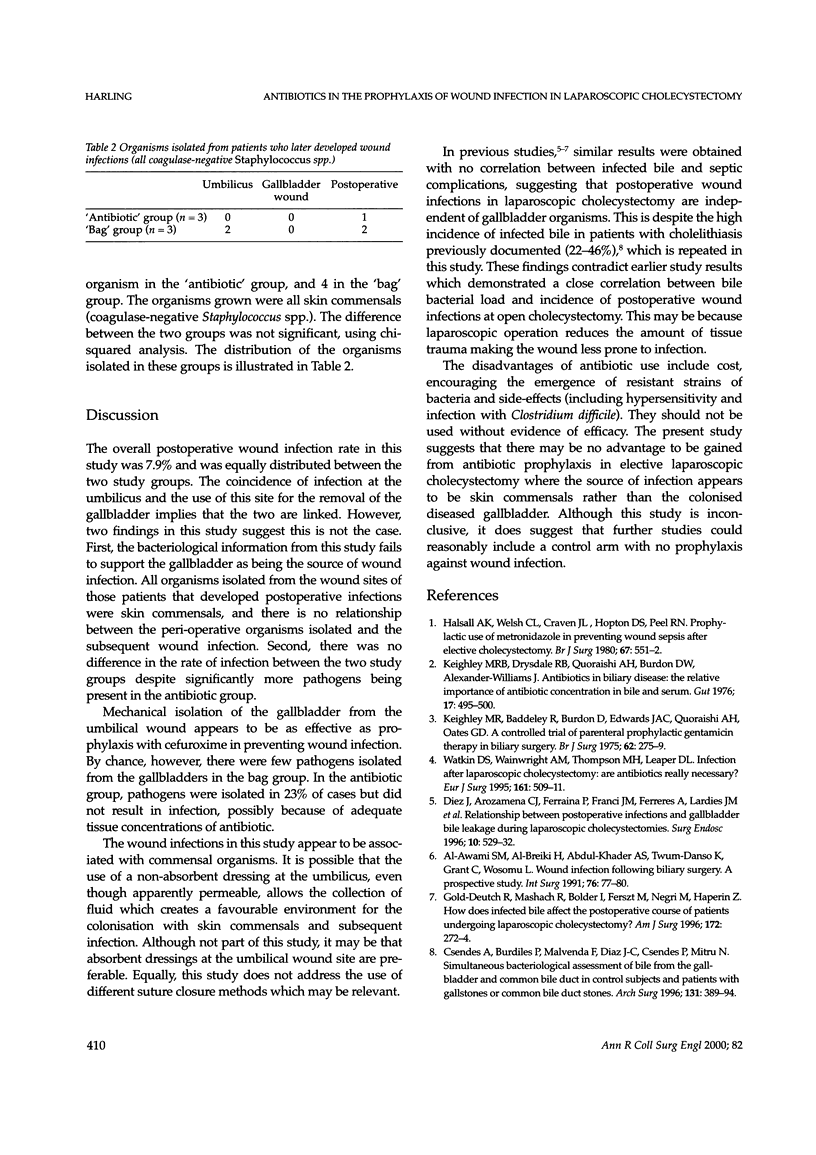Abstract
Septic complications are rare following laparoscopic cholecystectomy if prophylactic antibiotics are given, as demonstrated in previous studies. Antibiotic treatment may be unnecessary and, therefore, undesirable, so we compared two forms of prophylaxis: a cephalosporin antibiotic and bag extraction of the dissected gallbladder. A total of 76 patients undergoing laparoscopic cholecystectomy were randomised to either receive an antibiotic or to have their gallbladder removed from the abdomen in a plastic bag. Complicated cases were excluded. There was a total of 6 wound infections (7.9%), 3 in each of the study groups. All these were associated with skin commensals. There were no other septic complications. Bacteriological studies grouped the organisms isolated from the bile and the wound as potential pathogens and likely commensals. A total of 10 potential pathogens were isolated, 9 of which were found in the group receiving antibiotics. We conclude that septic sequelae of uncomplicated laparoscopic cholecystectomy are uncommon, but clearly not entirely prevented by antibiotic or mechanical prophylaxis. Prophylactic antibiotics may not be required in uncomplicated laparoscopic cholecystectomy. Further study is warranted.
Full text
PDF


Selected References
These references are in PubMed. This may not be the complete list of references from this article.
- Csendes A., Burdiles P., Maluenda F., Diaz J. C., Csendes P., Mitru N. Simultaneous bacteriologic assessment of bile from gallbladder and common bile duct in control subjects and patients with gallstones and common duct stones. Arch Surg. 1996 Apr;131(4):389–394. doi: 10.1001/archsurg.1996.01430160047008. [DOI] [PubMed] [Google Scholar]
- Diez J., Arozamena C. J., Ferraina P., Franci J. M., Ferreres A., Lardies J. M., Gutierrez V. P. Relation between postoperative infections and gallbladder bile leakage during laparoscopic cholecystectomies. Surg Endosc. 1996 May;10(5):529–532. doi: 10.1007/BF00188401. [DOI] [PubMed] [Google Scholar]
- Gold-Deutch R., Mashiach R., Boldur I., Ferszt M., Negri M., Halperin Z., Lin G., Sackier J., Halevy A. How does infected bile affect the postoperative course of patients undergoing laparoscopic cholecystectomy? Am J Surg. 1996 Sep;172(3):272–274. doi: 10.1016/S0002-9610(96)00105-5. [DOI] [PubMed] [Google Scholar]
- Halsall A. K., Welsh C. L., Craven J. L., Hopton D. S., Peel R. N. Prophylactic use of metronidazole in preventing wound sepsis after elective cholecystectomy. Br J Surg. 1980 Aug;67(8):551–552. doi: 10.1002/bjs.1800670806. [DOI] [PubMed] [Google Scholar]
- Keighley M. R., Baddeley R. M., Burdon D. W., Edwards J. A., Quoraishi A. H. A controlled trial of parenteral prophylactic gentamicin therapy in biliary surgery. Br J Surg. 1975 Apr;62(4):275–279. doi: 10.1002/bjs.1800620406. [DOI] [PubMed] [Google Scholar]
- Keighley M. R., Drysdale R. B., Quoraishi A. H., Burdon D. W., Alexander-Willians J. Antibiotics in biliary disease: the relative importance of antibiotic concentrations in the bile and serum. Gut. 1976 Jul;17(7):495–500. doi: 10.1136/gut.17.7.495. [DOI] [PMC free article] [PubMed] [Google Scholar]
- Watkin D. S., Wainwright A. M., Thompson M. H., Leaper D. J. Infection after laparoscopic cholecystectomy: are antibiotics really necessary? Eur J Surg. 1995 Jul;161(7):509–511. [PubMed] [Google Scholar]
- al-Awami S. M., al-Breiki H., Abdul-Khader A. S., Twum-Danso K., Grant C., Wosornu L. Wound infection following biliary surgery. A prospective surgery. Int Surg. 1991 Apr-Jun;76(2):77–80. [PubMed] [Google Scholar]


